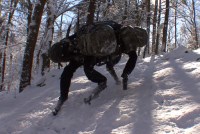Google buys Boston Dynamics, the Big Dog of robotics companies


Not satisfied with buying seven robotics companies in the past six months, Google has added the creator of the BigDog robot, Boston Dynamics, for an undisclosed sum.
This makes the company a supplier of military hardware. However, Google executives told the New York Times — which broke the story — that it "would honor existing military contracts, but that it did not plan to move toward becoming a military contractor on its own".
Boston Dynamics has developed a number of robots apparently inspired by animals, such as BigDog, Cheetah, and WildCat. It is also working on humanoid robots, with Atlas and Petman featuring on its YouTube video channel.
Google is making a significant push into robotics under the direction of Andy Rubin, who joined the company when it acquired his small startup company, Android Inc. Rubin started his career as a robotics engineer in Germany in the 1990s, and used a robot for Android's mascot.
Google's other robotics companies include Autofuss and Bot & Dolly, Schaft, Industrial Perception, Meka, Redwood Robotics, and Holomni.
Earlier, Rubin told the New York Times that he was working on "a 10-year vision". It's far from obvious what that might be. Robots such as BigDog have military applications as 21st century pack mules, which is why the Pentagon is funding this kind of research. The Darpa-funded Atlas is aimed at developing robots that can operate in disaster scenarios such as a nuclear power plant meltdown, but again, these would most likely be state-controlled operations, if not military-controlled.
Such robots could also be "weaponised", though Google presumably has no plans to build real-life equivalents to fictional Terminator-style robots.
The income from robotics is currently much too small to make any difference to Google's financial results, unless it comes up with a very popular toy — Boston Dynamics contributed to the Sony Aibo robot pet — or a "killer application" (sorry, not literally). The most likely prospect is the use of robots to help the care of the elderly, which is topic being researched in Japan.
Either way, Google makes so much money from its core advertising business that it can afford to waste billions on speculative projects, and this one could turn out to be a winner.